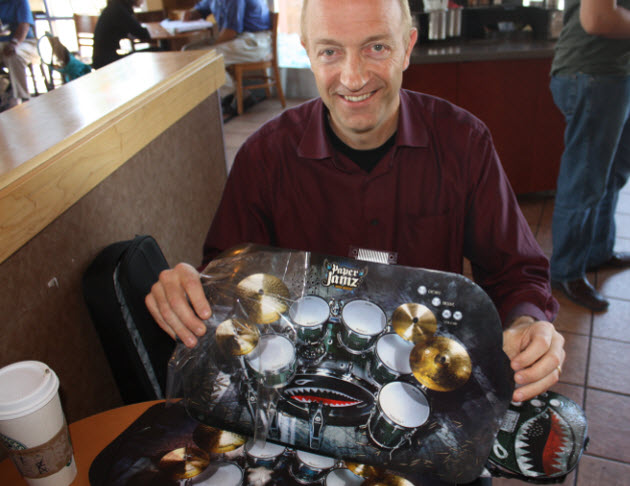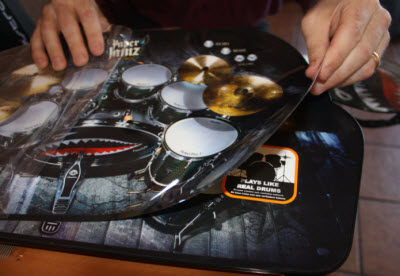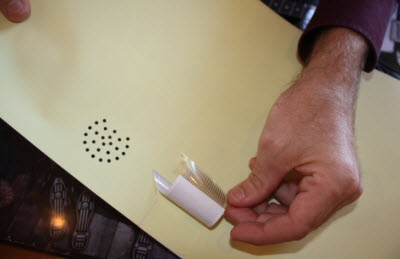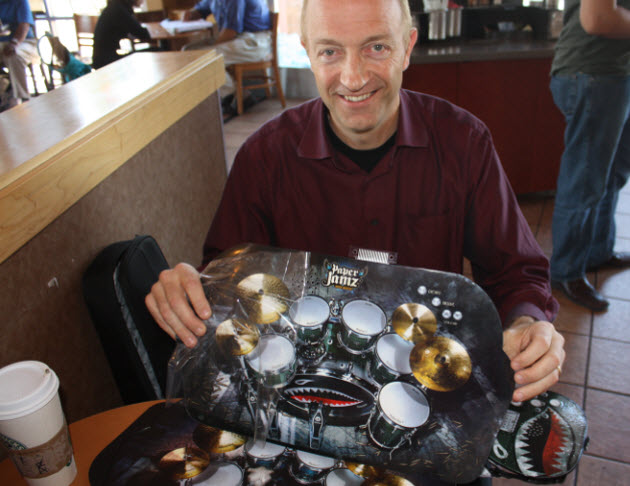
Toys and electronics are becoming a better and better match. The founders of Borei have created a new way to apply touch technology to plastic toys. The first product with the technology, the Paper Jamz Drum, has made it onto store shelves on a very short timetable.
The first toy made with Borei’s technology is akin to Guitar Hero meets the iPhone. You tap on the plastic sheet that covers the toy and it makes the sound of a drum. You can play three different songs in several modes, trying to repeat the pattern of the drum beat as closely as you can. It may not sound impressive compared to your Xbox 360 game console. But it’s selling for $24.99 in Walgreen stores now and is a remarkable achievement in low-cost electronics. 628 Design, a toy design company in El Segundo, Calif., created the toy for toy maker WowWee.
 San Jose, Calif.-based Borei found a way to mount capacitive touch technology — which is the same kind of touch-sensitive overlay used in iPhone and other touch screens — on plastic sheets. When you touch a part of the plastic, the pressure creates an electrical contact on a grid. The location of the finger touch is thus captured and transferred to the tiny microcontroller that runs the toy’s software, which triggers an action such as the sound of a drum.
San Jose, Calif.-based Borei found a way to mount capacitive touch technology — which is the same kind of touch-sensitive overlay used in iPhone and other touch screens — on plastic sheets. When you touch a part of the plastic, the pressure creates an electrical contact on a grid. The location of the finger touch is thus captured and transferred to the tiny microcontroller that runs the toy’s software, which triggers an action such as the sound of a drum.
The technology has been around for years. The plastic is made of the same material used in plastic drinking bottles. But Borei made the circuitry flexible enough to be packaged in just about anything at a very lost cost. The electronics in the Paper Jamz product, for instance, cost around $5 to manufacture, and it is paper-thin, as you can see from the image at the right.
The Borei flexible circuitry product was dreamed up by Chakriya Lao, chief executive of Borei; Khane Le, chief operating officer, and Khamvong Thammasouk. The latter was an executive at Synaptics, the touchpad sensor maker, which wasn’t interested in the toy market. They started Borei in late 2008 and early 2009, raising one round of angel funding. Paul Campbell, a former Hewlett-Packard executive who started five different businesses at HP, joined them in the spring of 2009.
“We saw that toys were losing the entertainment battle,” Campbell (pictured at top) said in an interview. “There are online games, the internet, TV, and music. Our objective is to put more entertainment value into and play back into toys.”
 So far, Borei has come a long way. Its first partner is WowWee, the robot toy maker that has a history of launching cool electronic toys such as Robosapien, Hoverod, and Perfect Puppy. WowWee makes the Paper Jamz toys and is them to Walgreen stores now and will make them broadly available at retailers starting on Friday. The drum toys come with six different styles, such as country and western, and three pre-loaded songs. (Since the technology is so cheap, you can’t download new songs into these devices). The drum set can be played freestyle, where you just make all the noise you want, or in perfect play and rhythm modes where you can learn and mimic the drum sounds in familiar songs. The toy is targeted at kids 8 and up. WowWee is also making a paper-based faux guitar (pictured left) using a different technology.
So far, Borei has come a long way. Its first partner is WowWee, the robot toy maker that has a history of launching cool electronic toys such as Robosapien, Hoverod, and Perfect Puppy. WowWee makes the Paper Jamz toys and is them to Walgreen stores now and will make them broadly available at retailers starting on Friday. The drum toys come with six different styles, such as country and western, and three pre-loaded songs. (Since the technology is so cheap, you can’t download new songs into these devices). The drum set can be played freestyle, where you just make all the noise you want, or in perfect play and rhythm modes where you can learn and mimic the drum sounds in familiar songs. The toy is targeted at kids 8 and up. WowWee is also making a paper-based faux guitar (pictured left) using a different technology.
 “I tested it on my kids, and my daughter just took it into her room and played with it,” Campbell said.
“I tested it on my kids, and my daughter just took it into her room and played with it,” Campbell said.
Future versions could integrate more technology. On top of that, Borei has other technologies that could be used in other kinds of toys. It’s not just a one-technology company. The flexible circuit boards that Borei created can be used inside superhero action figures or dolls, making those toys able to react to touch.
At the upcoming toy conference in Dallas in October, Campbell says that there could be a dozen prototype toys from a variety of toy makers using Borei technology. The toy designers love the flexible touch-technology because it gives them more design freedom within a given cost budget.
Borei has 25 employees and uses a variety of contractors in Silicon Valley, working on things such as printed circuit board layout. Campbell says the company has figured out the right balance of sophisticated technology and low-cost. Borei makes money in several ways, including royalties manufacturing electronics modules, and manufacturing whole toys. Its factories are located in China and Thailand.


